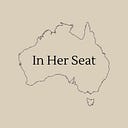Emma Hurst: Great and small
“It is about not only acknowledging but valuing all genders equally.”
Almost 100 years ago, Edith Cowan became the first woman elected to an Australian parliament, in March 1921.
In Her Seat is asking as many currently serving female politicians as we can how they view gender equality, politics and their impact.
This is a non-partisan project that is soliciting contributions from women in all parties, or none at all, in every parliament.
Emma Hurst is a Legislative Council Member of the New South Wales Parliament.
Emma has one of the most interesting backgrounds prior to entering politics — she is a registered psychologist, a body-builder and a long-term advocate for the rights of animals.
For over 15 years, she has been campaigning with organisations like PETA.
Emma was first elected in 2019.
Soon after her election as a Member of Parliament, Emma established and Chaired a NSW Parliamentary Inquiry into the Use of Battery Cages for Hens in the Egg Production Industry, recommending a phase-out of battery cage hen farming in NSW. She has now established an Inquiry into the Exhibition of exotic animals in circuses and exhibition of cetaceans in New South Wales, where she will serve as Deputy Chair. She is also leading a campaign against puppy farming and is drafting legislation to outlaw it.
Further, Emma has also advocated strongly on public integrity and government transparency.
What does gender equality mean to you?
To me, gender equality is about ensuring all genders have access to the same opportunities at a sociological, economic, health and educational level.
It is about not only acknowledging but valuing all genders equally, allowing everyone the chance to reach their full potential, and treating each and every person with respect.
Which female politicians have inspired or encouraged you?
Marianne Thieme — the founder of the Dutch Party for Animals, the largest political party dedicated to animal protection in the world — would be my biggest inspiration.
Marianne’s political success was the foundation of countless animal protection parties being established across Europe, and her unwavering commitment to achieving animal representation in politics and furthering women’s rights has inspired me to do the same in my Parliamentary role every day.
What inspired you to serve your community?
Right now, millions of hens are being imprisoned in battery cages where they can’t even turn around, female dogs are being held in puppy farms where they are forced to pump out litter after litter in squalid conditions, and greyhounds are facing a bullet to the head because they don’t run fast enough for profit.
They are the reason the people of NSW elected representatives for animals.
The NSW community is passionate about animal protection, yet these views are often not reflected in Parliamentary decision making.
Every day I hear from countless members of our community who are horrified by the treatment of animals here in our state.
I’m inspired to change that.
What are the most important contributions you are making in Parliament?
As a Member for the Animal Justice Party, my focus is primarily on achieving protection and political representation for animals in NSW Parliament.
Every day I make it my business to speak on behalf of animals in the House and put forward legislation that improves animal protection in NSW.
One of my proudest achievements so far has been our work towards the groundbreaking new domestic and family violence reforms being introduced in Parliament. These reforms not only recognise the link between animal abuse and domestic violence, but provide resources to overcome many of the barriers faced by victims escaping violence with companion animals.
The proposed legislative changes will recognise that animals can be used as a form of intimidation in domestic violence, and ensures animals will now be explicitly listed on Apprehended Domestic Violence Orders.
Further, a grant to help fund refuge centres to upgrade so they can accommodate animals will keep family units together.
What is next for gender equality in politics?
There is undoubtedly still a long way to go to achieve gender equality in politics, but with stronger female representation this goal is getting closer by the day.
What I believe we really need to work on now is elevating the voices of First Nations women and women of colour who remain greatly underrepresented in our political system.
In Her Seat interviews can be accessed here
